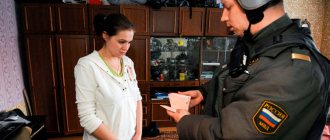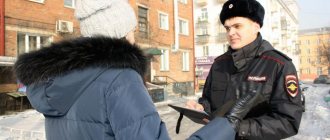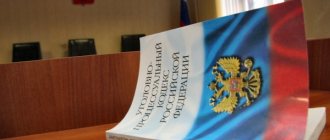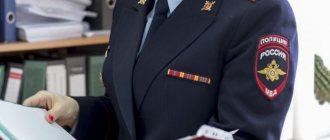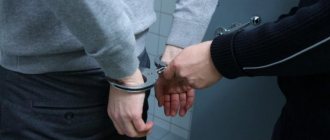Taking into account the latest laws adopted, I became extremely interested in what powers are vested in police officers today. The reason for this interest was not just curiosity, but an event that happened to me.
The fact is that a police officer allegedly showed up at my home address, identifying himself as a local police officer, and asked for detailed information about my neighbors. I was alarmed by the fact that this citizen did not show his official identification and was dressed in civilian clothes.
At first I was a little confused and didn’t know how to behave, although then I quickly figured it out and simply closed the door in front of the “guest”. Now I’ve decided to study some laws and clarify what a police officer is obliged to present, what powers he has and what obligations he must bear.
Article 25. Police officer
1. A police officer is a citizen of the Russian Federation who carries out official activities in a federal public service position in internal affairs bodies and who, in accordance with the established procedure, has been assigned a special rank provided for in Article 26 of this Federal Law.
2. A police officer is considered to be serving in the police also in the following cases:
1) being at the disposal of the federal executive body in the field of internal affairs, a territorial body, an organization included in the system of the specified federal body;
2) secondment to state bodies (bodies), as well as to organizations on the terms and in the manner established by the President of the Russian Federation.
3. A police officer serving in a territorial body performs the duties assigned to the police and exercises the rights granted to the police within the territory served by this territorial body, in accordance with the position being filled and job regulations (job description). Outside the specified territory, a police officer performs the duties assigned to the police and exercises the rights granted to the police in the manner determined by the head of the federal executive body in the field of internal affairs.
4. A police officer is issued a service ID, a special badge with a personal number, a badge, samples of which are approved by the federal executive body in the field of internal affairs.
5. A police officer is provided with uniforms at the expense of federal budget allocations. Samples of uniforms for police officers are approved by the Government of the Russian Federation. A badge is placed on the uniform of a police officer serving in public places, which allows identification of the police officer.
6. A police officer has the right to carry and store firearms and special equipment. The procedure for issuing, carrying and storing firearms and special equipment is determined by the federal executive body in the sphere of internal affairs.
7. A police officer is subject to mandatory state fingerprint registration in the manner determined by the federal executive body in the field of internal affairs.
8. Certain positions in the police may be filled by federal government civil servants.
9. Cadets, students, adjuncts, scientific and pedagogical workers, management staff and other employees of organizations carrying out educational activities to implement educational programs of secondary vocational education, higher education and (or) additional professional education and included in the system of the federal executive body in the field internal affairs are considered to be serving in the police.
History of the profession
All over the world you can meet people whose representatives are called police officers. Only during the time of the Union of Soviet Socialist Republics (USSR), and also until recently in Russia and Ukraine, this profession was called “policeman”.
As soon as any formation of a community of people occurs, the need immediately arises for those who will monitor the observance of law and order. At the beginning of the twentieth century, this was monitored by “gendarmes” and “royal police”, they were controlled by the revolutionary command, and only at the beginning of November 1917 the term “militia” was introduced , symbolizing the people's militia, which was properly armed, and was perceived by the common people as something very close to it.
At first these were ordinary volunteer detachments, which consisted of peasants and workers, but by the end of 1918 it was decided to form a state body from these squads.
Professional holiday
Police Day is celebrated differently in different countries. For example, in Russia it is celebrated on November 10 , and in Ukraine it is celebrated on August 4 .
Article 26. Special ranks of police officers
1. Police officers are assigned the following special ranks:
1) rank and file - private police officer;
2) junior command staff - junior police sergeant, police sergeant, senior police sergeant, police sergeant, police warrant officer, police senior warrant officer;
3) middle command - junior police lieutenant, police lieutenant, senior police lieutenant, police captain;
4) senior command staff - police major, police lieutenant colonel, police colonel;
5) senior commanding officers - major general of police, lieutenant general of police, colonel general of police, general of police of the Russian Federation.
2. Special ranks of police commanding officers are for life.
3. When a police officer is dismissed from police service, the words “retired” are added to the special rank.
4. A police officer may be deprived of a special rank in the manner prescribed by federal law.
Work of district police officers with the population
The local police commissioner is required to regularly conduct a tour of the territory. At the same time, he must be dressed in a service uniform. When contacting a citizen, a police officer must introduce himself. The district police officer has the right to enter private territory (plot, apartment or house) only with the consent of the owners. At the same time, the police officer is obliged to provide any possible assistance to people in emergency situations.
The responsibilities of the district commissioner during execution include receiving oral and written statements from citizens.
Article 27. Basic duties of a police officer
2. A police officer, regardless of the position he fills, location and time of day, is obliged to:
1) provide first aid to citizens affected by crimes, administrative offenses and accidents, as well as citizens who are in a helpless state or in a state dangerous to their life and health;
2) if a citizen applies to him with a statement about a crime, an administrative offense, an incident, or if a crime, an administrative offense, an incident is detected, take measures to save the citizen, prevent and (or) suppress a crime, an administrative offense, detain persons suspected in their commission, to protect the scene of a crime, an administrative offense, the scene of an incident and report this to the nearest territorial authority or police unit.
PEC regulations
Police officers participate in ensuring security and public order in the event of the introduction of special conditions in correctional institutions. Employees must inform the administration of the relevant institutions about the extension of the deadline for the return of convicted persons, if it is carried out under Article 97 of the Penal Code. The duties of police officers also include:
- Maintenance, security, escort of detained citizens placed in temporary detention facilities, suspected/accused of crimes, as well as those subjected to administrative punishment in the form of arrest.
- Accompanying persons in detention centers to participate in court proceedings or investigative activities. During these procedural actions, employees must protect these citizens.
Article 28. Fundamental rights of a police officer
3. A police officer, regardless of the position he fills, location and time of day, when performing the duties specified in Part 2 of Article 27 of this Federal Law, has the right:
1) demand from citizens and officials to stop illegal actions;
2) check citizens and officials for documents proving their identity and (or) confirming their powers;
3) stop vehicles, use, in urgent cases, vehicles belonging to state and municipal bodies, public associations and organizations (except for vehicles belonging to diplomatic missions and consular offices of foreign states, representative offices of international organizations), and in exceptional cases cases - vehicles owned by citizens to suppress crimes, pursue persons who have committed crimes or are suspected of committing them, to deliver citizens in need of emergency medical care to medical organizations, to tow damaged vehicles from the scene of a traffic accident vehicles for travel to the scene of a crime, administrative offense, or to the scene of an incident;
4) demand from persons suspected of committing a crime, an administrative offense, to remain in place until representatives of the territorial body or police unit or representatives of other law enforcement agencies arrive, as well as deliver persons suspected of committing a crime, administrative offense, to the office premises of the territorial body or police units, in the premises of a municipal body, in other office premises;
5) use physical force, special means and firearms on the grounds and in the manner provided for by this Federal Law.
Questions and answers
The actions of employees working in the Ministry of Internal Affairs, first of all, must always be reasoned and fully comply with the laws. There are many cases in which the actions of a police officer may violate the rights of a citizen. To eliminate such moments, it is worth considering the most common questions.
Does a police officer have the right to check documents on the street?
Document verification can be carried out if there are grounds, which could be a simple search for persons evading administrative punishment. For this reason, the procedure can be carried out even on the street on any person. Document verification means viewing an identity card.
There is an important point: any employee of the authorities must introduce himself and present his official identification. This must be done regardless of whether the police officer is in uniform or in plain clothes.
Can a law enforcement officer take away a passport?
First of all, you should remember that only an employee of the police department or the investigation department can pick up the documents. In other cases, there is no need to give away personal documents. A passport is taken only if a person is suspected of committing a crime and there is information about it. In all other cases, such an action is illegal.
Do the police have the right to search on the street?
A police officer may search the street if there are appropriate reasons, for example, the presence of prohibited items is suspected or the person resembles a person. But there are several nuances. The Ministry of Internal Affairs employee must introduce himself in full and explain the reason for the procedure. A search on the street must take place under protocol and in the presence of witnesses. This procedure should not be confused with a search, during which a person may be asked to unbutton his jacket or open his bag. This type of search is standard procedure and is completely legal.
Do the police have the right to stop people on the street without reason?
Without a reason, detention on the street or in another public place is impossible in principle. The only possible event is a detention at the scene of a crime in which a citizen is suspected. In this case, the citizen is detained and escorted to the nearest department of the Ministry of Internal Affairs to give evidence.
Do the police have the right to question a minor without their parents?
It is required to interrogate, that is, obtain testimony on record, a minor offender or a witness under 16 years of age only in the presence of parents or legal representatives. Without them, interrogation is not legal, unless there is a corresponding court order that will authorize this procedure.
Do the police have the right to stop a car?
In accordance with the law, any police officer has the right to stop a car. This can be done when stopping a violation or checking documents. To receive a fine, the policeman already accompanies the citizen to the traffic police post or department.
Does a police officer have the right to check documents for a car?
The policeman has the right to check documents for both the car and the cargo. The only difference from the actions of a traffic police inspector is that if there are violations, you will have to call the traffic police.
Do the police have the right to enter the apartment?
There are several established cases in which an employee of the Ministry of Internal Affairs can enter. For example, such action requires special circumstances, such as danger to persons living there or the arrest of a criminal, as well as the existence of a court order. But there are nuances. The employee must introduce himself in full, show identification and explain the reason for the visit. If he did not do this, then there is no need to let him in, even if he is a local police officer who is known to the residents.
Does a police officer have the right to film with a phone?
Photography is permitted at any event. It can be done either on a phone or on a camera. In the future, such materials are added to the case, in particular as evidence of refusal to comply with legal requirements or inadequate condition. Civilians also have the right to film, but only if this does not interfere with the conduct of operational-type activities and the employees themselves doing official work.
Does a police officer have the right to check a phone?
Checking the phone is possible only during operational activities and is mandatory according to the protocol, which implies the presence of witnesses. It’s just that an employee does not have the opportunity to pick up a telephone device and view it.
Article 30. Guarantees of legal protection of a police officer
1. A police officer, performing the duties assigned to the police and exercising the rights granted to the police, acts as a representative of state power and is under the protection of the state.
2. When performing official duties, a police officer is subordinate only to his immediate and other direct superiors. No one has the right to interfere with the lawful activities of a police officer, except for persons expressly authorized by federal law. No one has the right to force a police officer to perform duties that are not assigned to the police by this Federal Law. When receiving an order or instruction that is clearly contrary to the law, a police officer is obliged to follow the law.
3. The legal requirements of a police officer are mandatory for fulfillment by citizens and officials.
4. Obstructing a police officer from performing his official duties, insulting a police officer, resisting him, violence or the threat of violence against a police officer in connection with the performance of his official duties, or failure to comply with the legal requirements of a police officer shall entail liability under the legislation of the Russian Federation.
5. A police officer is not obliged to give any explanations on the merits of the cases and materials in his proceedings, as well as to provide such cases and materials, including those affecting the rights and freedoms of man and citizen, for review other than in the cases and in the manner prescribed legislation of the Russian Federation.
6. State protection of the life and health, honor and dignity of a police officer and his family members, as well as property belonging to him and his family members, from criminal attacks in connection with the performance of official duties is carried out in the manner established by the legislation of the Russian Federation.
7. Measures of state protection are also applied in relation to close relatives of a police officer, and in exceptional cases - in relation to other persons whose life, health and property are attacked in order to impede the legitimate activities of a police officer or force a change in its nature, as well as from revenge for said activity.
Additionally
Police officers supervise the compliance by persons who have served a criminal sentence with the prohibitions and restrictions provided for them by federal legislation. In addition, employees monitor the behavior of citizens who are subject to non-custodial sanctions. The police are responsible for ensuring the protection of witnesses, victims and other participants in criminal proceedings. The latter, in particular, include judges, prosecutors, investigators, employees of regulatory and law enforcement agencies.
Article 33. Responsibility of a police officer
1. A police officer, regardless of the position he fills, is responsible for his actions (inaction) and for the orders and instructions given.
2. For illegal actions (inaction), a police officer bears responsibility established by federal law.
3. Harm caused to citizens and organizations by unlawful actions (inaction) of a police officer in the performance of his official duties is subject to compensation in the manner established by the legislation of the Russian Federation.
4. For damage caused to a federal executive body in the field of internal affairs, a territorial body, a police unit or an organization included in the system of the said federal body, a police officer bears financial liability in accordance with the labor legislation of the Russian Federation.
Features of the policeman's profession
Education begins from childhood, and the formation in the child’s mind of such an important figure as a person who monitors order and the correct execution of all processes is a very significant factor in the little person’s assessment of everything that happens in the world.
Children need to be taught that the main thing is order, which should be everywhere: in the house, on the street, at school, etc. The task of establishing order should be carried out by specially trained people - police officers. They must prevent crimes from being committed and avoid hooliganism. They are also obliged to help all those who are in trouble and those who need help.
Professional skills and abilities
When joining the service, a police officer must have a set of skills and abilities, among which are the following:
- high physical fitness, coordination, strength, speed, endurance;
- resistance to high psychological stress;
- speed of decision-making in the current situation;
- emotional stability.
Personal qualities of a police officer
The position of a police officer requires certain qualities:
- speed of thinking;
- development of logic;
- literacy;
- multitasking;
- concentration;
- good memory;
- high observation ability.
Career
The career of an employee of the Ministry of Internal Affairs (Ministry of Internal Affairs) is very complex and multi-stage, and depends mainly on personal connections, experience, public opinion and other factors, and often on the abilities of the person himself.
Places of work
The places of work of police officers may be the following:
- duty units;
- district and regional police departments;
- traffic police;
- temporary detention facilities;
- prisons;
- legal authorities;
- courts.
Earnings
The minimum salary for patrol police in Russia is $280. At the same time, department employees can receive a maximum of $1,500 per month . However, the situation is not the same in all cities of the country. Moscow remains the city with the highest police salary, which is due to the higher standard of living in the capital as a whole. A police officer's salary there is $1,857 . In the cultural capital of the Russian Federation, the city of St. Petersburg, the salary level of an employee of the Ministry of Internal Affairs has not changed for a long time and remains at around $1,300 per month .
Checking incoming information
Many residents of Russia are wondering: is a police officer obliged to check information received from citizens? When an employee of the Ministry of Internal Affairs receives information from a citizen about the commission of a crime, he is obliged to check it for accuracy. To do this, the employee may go to the applicant to obtain a detailed written explanation from him. In this case, the police officer is obliged to explain to the person the purpose of the visit and the responsibility for giving false testimony. If the civilian allows it, a law enforcement officer can inspect the home. If a police officer has permission from the court, he has the right to enter and conduct an inspection of the premises without the consent of the resident.
